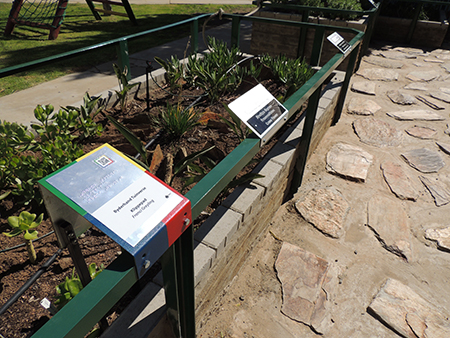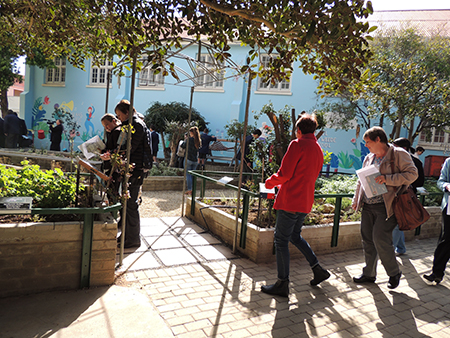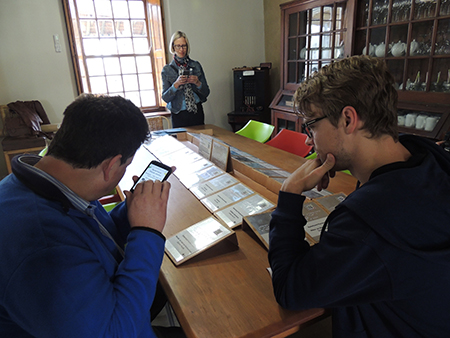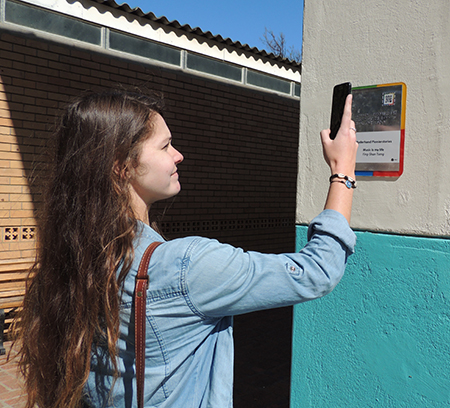The subject group Creative Writing of the North-West University (NWU) took on a Byderhand project together with the Pioneer School for the visually impaired in Worcester. This project was introduced in an excellent manner in Worcester on 30 August 2018 with the opening of the multisensory garden at the Pioneer School.
Byderhand, an interdisciplinary creative and research project, presents interactive reading experiences in which location and literature can be experienced in a whole new manner. The Byderhand team has already undertaken various other projects. However, with this project at the Pioneer School the team specifically conducted some research to make sure that the project is accessible to visually impaired persons.
The project in Worcester has three parts, namely Pioneer Stories, Garden Verses and Karoo Garden Verses. Writers and artists in the project include famous poets, as well as learners, former learners and staff from the Pioneer School.
To make the project accessible to visually impaired as well as seeing persons, a combination of media was used. The concrete and digital user interfaces consist of instructions in braille, signs with QR codes, and a digital interface in which speech technology is used. The interface design is the work of Gustaf Tempelhoff, a multimedia designer who is doing his master’s degree study in graphic design as part of the project.

Braille and large print were used for the signs with information indicating the garden verses and the plants. The rocky path was specially made to form part of the verse “Klippepad”.

The multisensory garden at the Pioneer School for the visually impaired presents an enriching experience to learners at and visitors to the school. The Byderhand Garden Verses form part of the garden.
All the stories and poems were recorded and can be experienced via smartphones or tablets. It is this auditive component that makes the Byderhand project so accessible to the visually impaired, as one can see from the enthusiastic reception of the project.
The multisensory garden on the school premises was developed by the Pioneer School and Brackenfell High School as part of the ATKV’s Handevat project, and was completed in collaboration with the Karoo Desert National Botanical Garden, Afrikaans.com and Byderhand.
The garden provides learners with a special multisensory experience: the plants in the garden were selected with a focus on smell and touch; the pathways were designed with different textures; outdoor musical instruments made from recycled materials invite learners to play along and make music; and a mural with idioms about sound by Afrikaans.com completes the garden.
The contribution of Byderhand to the multisensory garden includes 10 garden verses and children’s verses by William Rowland, Hans du Plessis, Bernard Odendaal, Daniel Hugo, Floris A Brown and Franci Greyling. Some of the verses are complemented by musical arrangements, translations and typographical animations so that learners can experience the works in various ways.
Dr William Rowland, who was the head of the South African National Council for the Blind and president of the World Blind Union, opened this multisensory garden. His poem “Die huis waar ek woon” is the main poem of the project. Dr Rowland has great praise for the ingenuity and innovative character of the Byderhand project. “As far as I know this is a world first. The connection of poetry with garden plants and trees, the story-telling project, the technology being used in the project – I am not aware of a similar project anywhere.”
The second part of the project, Pioneer Stories, was written and told by the learners, former learners and staff of the Pioneer School, as well as visually impaired persons form the Worcester community. These stories can be experienced in Blindiana Barista, a coffee shop at Innovation for the Blind in Worcester. Authors in this project attended a sociable presentation event in Blindiana Barista. The story of Joseph Matheatau, the coffee shop’s blind barista, forms part of this story collection. The Pioneer Stories were also put up on the school premises at the locations where these stories took place, presenting a location-specific and concrete experience to the learners.

Quinten Pendle and Gustaf Tempelhoff listen to Quinten’s story together.

Rouxne van der Westhuizen scans one of the QR codes that has been put up on the school premises.
A third part of the project in Worcester is undertaken in collaboration with the Karoo Desert National Botanical Garden. Poets with a connection to Worcester and the Breede River Valley were invited to write poems about the area. These poems will form part of the new braille route that is currently being developed in the garden. The poems by 10 authors, including Diana Ferrus, William Rowland, Daniel Hugo and David Kramer, were translated into English, Portuguese and German among other languages. This project was introduced during a cocktail event in the botanical garden where guests could listen to the poems being read aloud by the poets themselves. The guests agreed that the combination of the Karoo landscape and the poems presents a special experience for visitors to the garden.
This challenging project was and still is a special enriching experience, and the project will remain part of the ongoing research and community engagement of the subject group Creative Writing.
Byderhand is undertaken within the research unit Languages and Literature in the South African Context on the Potchefstroom Campus of the North-West University. The project is a good example of a creative project in the Digital Humanities.
Project website: www.byderhand.net
Contact Prof Franci Greyling at franci.greyling@nwu.ac.za for more information.
*Photos taken by Prof Franci Greyling.
